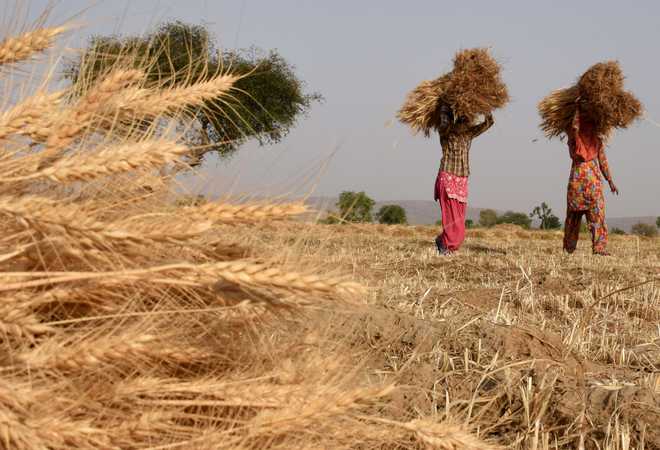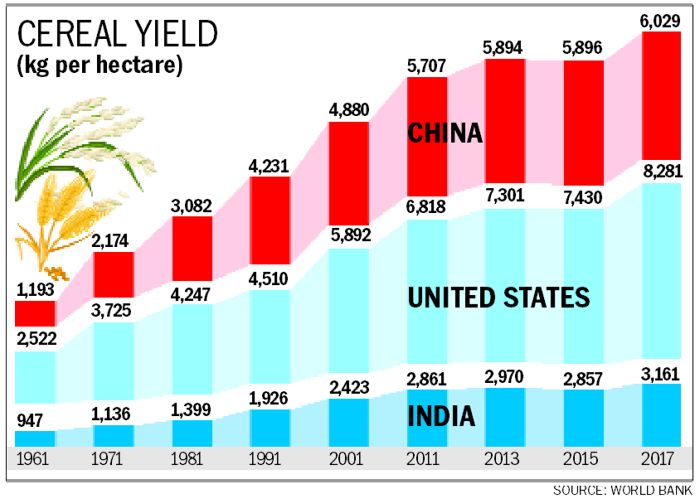
In an agrarian economy like that of Punjab, agricultural production and the export of produce are giving a much-needed fillip to the economy. File photo
Ruchika M Khanna
The agriculture sector showed its famed resilience even when the Covid-19 pandemic was at its peak. In an agrarian economy like that of Punjab, agricultural production and the export of produce are giving a much-needed fillip to the economy.
The export of basmati rice, kinnow and non-basmati rice sourced from the fields of Punjab, seed potato, some vegetables, honey and even processed food like chilli paste and tomato paste has seen a surge in the past year. The state’s food producers and exporters have not only consolidated their position in the overseas markets, but have also entered new markets abroad.
The data released by the Ministry of Commerce and Industry recently shows that the export of rice, wheat and coarse cereals rose to Rs 49,832 crore during April-December 2020 (from Rs 32,591 crore reported during the same period in 2019). The export of non-basmati rice jumped by over 100 per cent, while the export of basmati rice was 19 per cent higher than in the corresponding period of 2019. Though state-specific export data is not released by the government, it is estimated that the majority of basmati rice was exported from Punjab and the non-basmati variety exported was also sourced from the state.

Ranbir Singh, General Manager, Punjab Agri Export Corporation Limited (PAGEXCO), says that other than these cereals, the export of horticulture crops like kinnow, seed potatoes and processed food like chilli paste and tomato paste, besides honey, has shown an impressive growth this year. “As many as 56 containers of red chilli paste and 120 containers of organic basmati rice and wheat flour have been exported so far this year from the state. Europe, Australia and West Asian countries are looking at the state for sourcing agriculture produce,” he says. He adds that the surge in agri product exports from India is sure to break China’s monopoly in world trade, especially in red chilli and tomato paste.
What has aided this surge, says Vinod Kaul of the All India Rice Exporters’ Association, is the demand for foodgrains created across the developed world during the course of the pandemic. Many countries wanted to build their foodgrain stocks and thus they started importing huge quantities of grains. “Also, countries such as Thailand and Vietnam banned the export of grains during the pandemic, but India continued with it,” he adds.
In December 2019, PAGEXCO had come up with an Agriculture Export Policy (AEP). It focused on having a medium-term to long-term strategy to increase exports of agricultural produce from Punjab by strengthening back-end and front-end infrastructure to boost the export of fresh and value-added fruits and vegetables. It also talked of identifying focused commodities and clusters for developing export-related infrastructure and undertake capacity building of farmers towards making them ready to explore the markets abroad. According to this policy, the target was to take Punjab’s exports to $4,997 million by 2027-28.
“We are working towards attaining these objectives,” says BS Sidhu, Agriculture Commissioner, Punjab. “On the production side, we are continuously striving to reduce the use of red chemicals in crops so as to bring down the maximum residue limit (MRL) of pesticides on grains and other crops. We are replacing harmful pesticides with green ones so as to improve the quality of our agricultural produce and make it ready for premium export markets,” he adds.
While quality is being looked into, exporters of food products from Punjab say that the most urgent government intervention required as of now is the opening of the two international airports for exports of agro foods to bring down the freight costs post-lockdown that have led to monopolistic trade by big shipping lines. “The cost of taking one container to Europe has gone up from $700-800 to $3,000 and the rates to the US have doubled to $4,000. Though we have added new markets for basmati export like China and West Indies, we are aware that this is panic demand triggered by the pandemic. To sustain the demand, we will not only have to improve quality of our produce, but also rationalise our costs, including freight costs,” says Arvinder Singh, a leading basmati exporter from Punjab.
Send your feedback to [email protected]
Join Whatsapp Channel of The Tribune for latest updates.



























